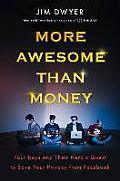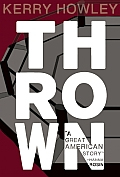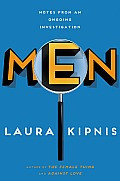Year End NonFic Wrap-up: Dwyer, Howley, Kipnis
More Awesome Than Money by Jim Dwyer

There’s a lot of books that should be in your head as you read this, maybe chief among them You Are Not A Gadget by Jaron Lanier, a book in which Lanier argues (it was the first place I’d seen the argument made so clearly and devastatingly) that Facebook doesn’t *do* anything in terms of money-generation aside from get info about its users: it is, at best, a venue on which folks share stuff and, for that privelege, they transform from users or consumers to the actual products advertisers pay Facebook to gain access to. I don’t have Lanier’s book handy and I’m sure I’m garbling his argument, but it’s along those lines.
And, sure, Facebook’s an awfully easy target, but that doesn’t make it any less significant to actually target it. Dwyer, in both the intro and the first chapter, make it clear why Facebook’s a danger: for a relatively small number of assets or tools, users allow it total access to personal stuff we wouldn’t, in any other context, allow. “‘I will give you free web hosting and some PHP doodads, and you get spying for free, all the time.’ And it works” This, from chapter one, comes from the lips of Eben Moglen, a technologist and lawyer whose speech on a Friday night at NYU opens the book. Whta’s the solution to Facebook? What’s the way forward?
Four students at NYU came up with Diaspora, an open-source Facebook that’d allow folks to own their profiles and the resultant info about themselves. In other words: damn the advertisers and get back to the social networking part of things. Dwyer tracks the group’s efforts as it has one of those magic Kickstarter fundraisers that gulls the sails fully with air and then���of course���works to keep the original intent and idea behind the endeavor front-and-center. We’ve all read plenty of watch-how-practicality-kills-the-initial-optimistic-promise books, world-vs-imagination things, but More Awesome Than Money is infinitely better than that mereness: it’s a smart and sad but hopeful book about ways in which we may yet make the internet more than just a place of pop-up ads and spying. It’s hard not to read the thing and finish it with a fair amount of hope; that’s either a warning or promise, depending on your outlook, I suppose.
Oh dear lord is this thing great. Look, Ms. Awesome herself (K Dunn) reviewed the thing for the NYTimes what a month or so back, and she’s plenty on the money throughout. Story is: an academic woman (grad student in philosophy) named Kit is at a conference in Iowa when she gets bored enough to wander from the presentation she’s at and, in wandering, comes upon an MMA match at which she watches Sean Huffman and has a transcendent experience (“It was as if someone had oil-slicked my synapses, such that thoughts could whip and whistle their way across my mind without the friction I’d come to experience as thought itself. I felt an immense affection for the spectacle before me, but it was as if the affection were not emanating from anywhere, because I had dissolved into a kind of mist and expanded to envelop the entire space that held these hundred men.” If you’re wondering that’s page five: Howley’s very much unafraid to dunk yr head very quickly and very intensely into the waters of her gripping, torqued poetry [more? Page 6: “My experience echoed precisely descriptions handed down to us in the writings of Schopenhauer, Nietzsche, and Artaud, in which a disturbing ritual���often violent���rendered each of their senses many times more acute, as if the dull blunt body were momentarily transformed into a tuning fork, alive, as Schopenhauer put it, ‘to sensations fine and fleeting.’ Some have called the feeling ecstasy. I believed in this spectacled-provoked plenitude of sensation as one believes in Pangea and plundering Huns, but until that night in Des Moines I associated that state with antediluvian rites not accessible to modern man. Around midnight on an Iowa highway surrounded by that deep darkness only cornfields can conjure, I thought ‘This exhibition, whatever it may be, has ushered ecstatic experience back into the world.'”). She follows Sean���a fighter with a fondness for smoking pot and telling himself he should be working out instead of working out (which is to say he’s hugely compelling despite not being a Fighter one imagines is gonna take over the world) and also a fighter named Eric Koch, a much younger and more dedicated (in ways) fighter than Sean.
With these two fighters set up as polarities (or at least far-markers of MMA-types: an older guy who allows his body to be just brutalized and can sort of hump through it vs a younger guy who’s all grit and muscle and tendony ferocity) for her and our consideration, Kit (who is not, to be clear, Kerry Howley���it’s a fictionalized nonfiction book, a genre-bending only the most fussy fuddy-duddies will allow themselves to be uptight about) follows each fighter, describing scenes and fights with a vividity that will induce clenching while also describing personal/emotional stuff in each fighter’s life (in Sean’s, a child with questionable paternity; in Eric’s, a schism with his brother and the group of friends through whom he got into MMA). Everyone’s personal life is of course interesting enough if written well, and here’s where to note Howley’s writing’s so fucking brutally good you’d be impelled to read thousands of words of hers on I’d venture damn near anyone, but the other thing that actually happens is���and maybe this is a function of having a fictionalized narrator���Kit herself is exposed in her pursuit as well. This is a book in which each major character���Sean, Eric, and Kit���has pursuits of some sort, which may not seem to be saying much (what book lacks such?) but the way it’s resolved is actually, totally, truly astonishing. Look again at the language Kit uses on page 5 to describe the rush and release visited upon her on witnessing her first fight: she spends the rest of the book, obviously, seeking the same hit and high. How could she not? And in that process, by the end, everyone in Thrown is variously used and hurt and pulped in some way by these pursuits, and���in an act that sure reads like something kin to grace���Howley lets kit be the one who is in some ways worst by the end: she’s the one with this unquenchable urge to see more fights, more transcendant physical beauty, and, because of that, neither Eric nor Sean can ultimately fulfill her. She has to keep moving, keep���like the fighters���searching for the next chance for such a high, and the ending’s sadder than anything I could’ve imagined. It’s a multivalently devastating book and worth every inch of praise that’s been heaped on it.
To be clear: you’re a fool not to read Kipnis, always, everywhere, any chance you get. I was first suckered for her through her Against Love, but her subsequent ones (How to Become a Scandal and The Female Thing, to which Men serves as something of a counterbalance) are dazzling books so keenly observed and engaging it’s almost tiring. I mean that: reading Kipnis has, for me, always induced this feeling of like she can’t keep doing this, can she? It’s like eating too much rich food, six pounds of something you’re supposed to only have tastes of. She’s clever as hell and writes such sharp sentences it feels like reading a hummingbird or sprinter, and then you go how can she keep up a whole book like this? Here’s what I mean: “Avoiding self-delusion: here’s a useful life lesson for all of us, though easier said than done, self-delusion being pretty much the definition of the human condition.” That’s from page 33, opened to at random, from the chapter “The Con Man,” which chapter focuses on the old Mamet film “House of Games,” and I’m not kidding: Kipnis writes constantly with that much precision and verve and insight, which precision and verve and insight here going toward examining types of men, at ways in which men operate in the world. It’s weird: this isn’t some ha-ha taxonomy, yet the chapters are fascinatingly set-up as such (The Scumbag, The Lothario, Gropers). What happens, though, early on���maybe even in “The Scumbag,” a chapter that, in considering Hustler publisher Larry Flynt, Kipnis praises his authentic scumminess over the sanitation job given his image after the Woody Harrelson movie���is that the reader understands quickly that Kipnis is examining men in relation to men and women and society at large (which is a huge relief, the reader soon finds). All of this boils down to the fact that this book and The Female Thing could and maybe should come packaged together and should have titles that switch randomly, one being called Action and one being called Equal and Opposite Reaction. What I’m trying to say is that Kipnis isn’t doing some bloodless examination of men, or the male condition: she’s interested in the sweaty, bloody, gnarly real way actual real men really are (like most of the folks I’ve read who’ve reviewed this book [Kerry Howley did a pretty incredible one here], I find the “Men Who Hate Hillary” essay both monumentally hilarious and discomfittingly clear-eyed in an open-secret sort of way). I can’t imagine what honest dude doesn’t read this book with the more-than-occasional knowing nod, and it’s impossible to imagine a smarter book this funny, or a funny book this smart, or what the fuck ever: read the thing. Read.






